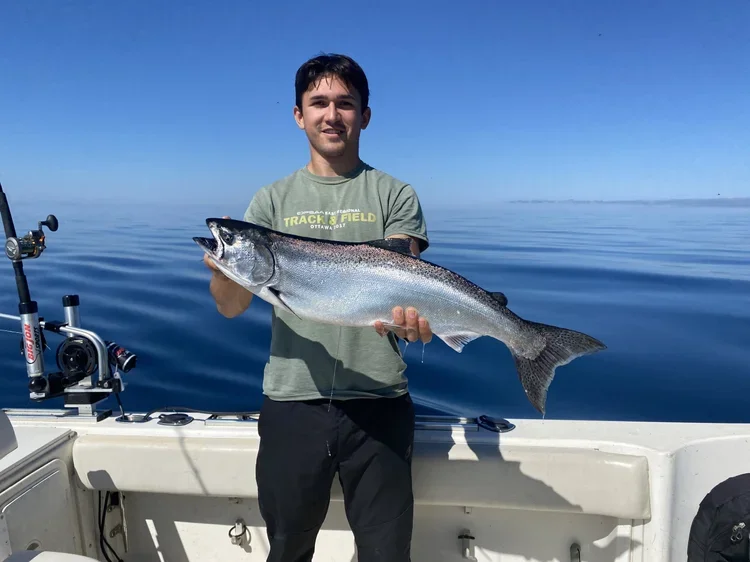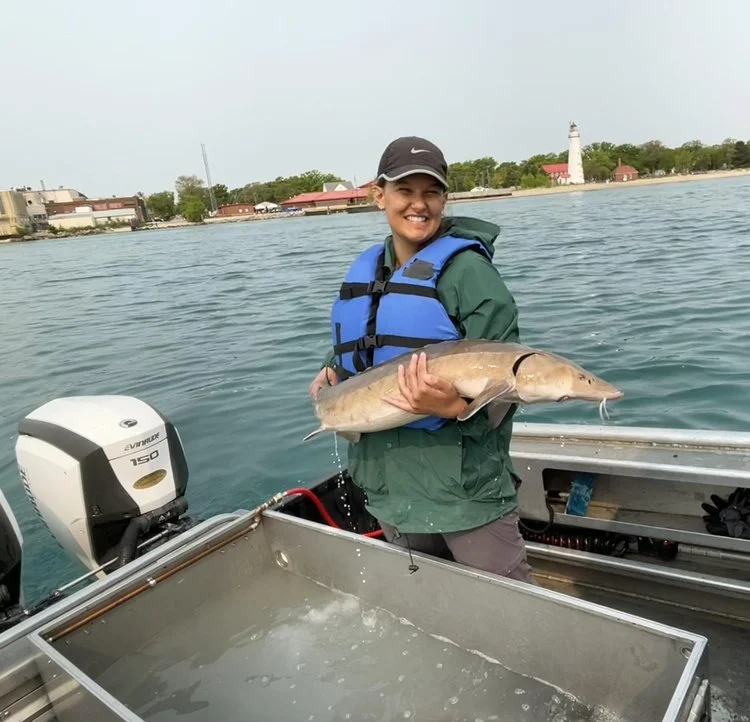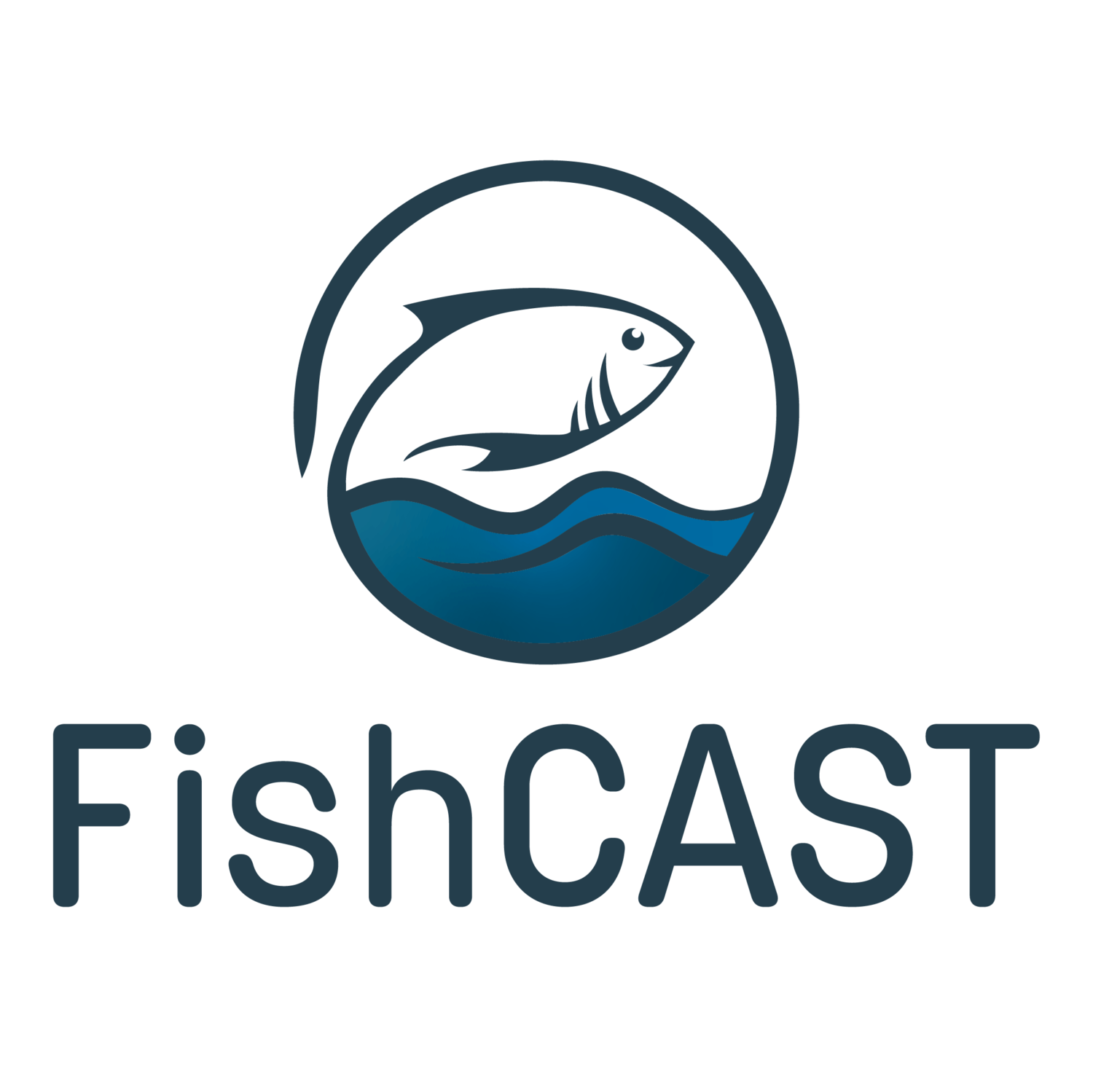FishCAST Alumni
-

Kevin Adeli
(he/him)
Cohort 4
Kevin earned his MSc degree from Western University where he was supervised by Dr. Bryan Neff. Kevin studied the cardiovascular effects of thiamine deficiency among salmonines of the Great Lakes. His research interests include aquatic ecology and fisheries conservation.
FishCAST Internship completed with Ontario Ministry of Natural Resources and Forestry.
Western University Alum
-

Katrina Audet
(she/her)
Cohort 2
Katrina started with FishCAST as an undergraduate student and graduated after earning her Master’s degree. She was part of Dr. Margaret Docker’s lab at the University of Manitoba. Her research focused on using environmental DNA (eDNA) to monitor and map the distribution of fish stocks in Lake Winnipeg, in comparison to the traditional method of gillnet index surveys.
FishCAST Internship completed with Manitoba Natural Resources and Northern Development.
University of Manitoba Alum
Katrina is currently employed as the eDNA Lab Manager at Prairie Scientific Inc.
-
Peter Baker
(he/him)
Cohort 2
Peter is a graduate from the MSc Biology program at Western University, supervised by Dr. Bryan Neff. Peter studied the effects of invasive species on lake trout physiology and how this has hindered their restoration efforts in Lake Ontario. His research interests include aquatic ecology, restoration biology, and fisheries science.
FishCAST Internship completed with Ontario Ministry of Natural Resources and Forestry.
Western University Alum
Peter is currently employed as a Statistical Analyst with Biodiversity Pathways.
-

Dr. Ghizlane Banousse
Cohort 1
Ghizlane was a PhD student co-supervised by Dr. Céline Audet and Dr. Christina Semeniuk. She studied fish ecophysiology and genomics. Her PhD research focused on the transcriptional modifications linked to the physiological and behavioral responses of brook charr to global warming.
FishCAST Internship completed with Pourvoirie des Bouleaux Blancs.
Université du Québec à Rimouski
-

Dr. Albana Berberi
(she/her)
Cohort 1
Albana was a PhD student at Carleton University, supervised by Dr. Vivian Nguyen and Dr. Steven Cooke. She studied human-freshwater ecosystem interactions in Ontario recreational fisheries. Her research interests include applied ecology, evidence-based policy making, and science communication.
FishCAST Internship completed with Ontario Ministry of Natural Resources
Carleton University Alum
-

Roland Eveleens
Cohort 1
Roland investigated conservation and restoration freshwater mussel species in the Lower Great Lakes as part of the Canada Nature Fund for Aquatic Species at Risk work being undertaken by the Healthy Headwaters Lab, based at the Great Lakes Institute of Environmental Research (University of Windsor). His MSc research investigated changes in community assembly both across and within sub-watershed of the Sydenham River. Originally from New Zealand, Roland’s research interests are focused around using community ecology knowledge to better inform successful freshwater management and restoration.
FishCAST Internship completed with St. Clair Region Conservation Authority
University of Windsor Alum
Roland is currently employed as a Freshwater Scientist at Cawthron Institute.
-

Olivia Galloway
(she/her/hers)
Cohort 3
Olivia completed her MSc degree at the University of Windsor, she was supervised by Dr. Trevor Pitcher. She is passionate about species at risk conservation and recovery as well as science communication. Her research investigated how various enrichment factors can influence the reintroduction success of threatened juvenile Lake sturgeon in the Great Lakes.
FishCAST Internship completed with the Department of Fisheries and Oceans Canada.
University of Windsor Alum
Oliva is currently employed as a Fisheries Biologist at Parsons Corporation.
-

Ryan Graham
(he/him)
Cohort 1
Ryan’s research focused on agricultural drainage, the vegetational communities within them, and implications of phragmites management. He graduated from the MSc program in Environmental Science at the University of Windsor (GLIER) and was supervised by Dr. Catherine Febria.
FishCAST Internship completed with Nature Conservancy of Canada
University of Windsor Alum
-

Dr. Andrew Howarth
Cohort 1
Andrew graduated from the PhD program at Carleton after focusing his research on the socio-ecology of Canada's inland fisheries, which includes fisheries management, angler stewardship, and fish physiology. He was co-supervised by Dr. Vivian M. Nguyen and Dr. Steven J. Cooke, and was a member in both labs. He is interested in building more resilient freshwater fisheries, and motivated by the connections he’s seen form—and barriers broken down—by a common interest in fish.
FishCAST Internship completed with Ontario Ministry of Natural Resources and Forestry.
Carleton University
-

Brooklynne (Litke) Keber
(she/her)
Cohort 2
Brooklynne participated in the FishCAST program at both the undergraduate level and then at the Master's level at the University of Manitoba where she was supervised by Dr. Margaret Docker. Brooklynne's research focused on the use of environmental DNA to map the distribution of native lampreys in Manitoba. She started this research with her B.S.c. (Hons) and expanded it during her research as a MSc candidate in Biological Science. Her research interests include fisheries research, species at risk, environmental DNA, and applied biology.
FishCAST Internship completed with the Department of Fisheries and Oceans Canada.
University of Manitoba Alum
Brooklynne is currently employed as a Genetics/Genomics Specialist at Assiniboine Park Conservancy.
-

Nolan Lachance
(he/him)
Cohort 2
Nolan was an undergraduate Thesis student in Interdisciplinary Arts & Science at the University of Windsor and is supervised by Dr. Catherine Febria as a member of the Healthy Headwaters Lab. He is studying benthic communities in the Sydenham River in correlation to mussels' habitats. Nolan's research will compare diversity metrics across small tributaries to those found in large rivers, looking at various environmental factors and conditions that influence biodiversity in such communities.
University of Windsor
-

Dr. Christine Madliger
(she/her)
Cohort 2
Christine was a postdoctoral research fellow co-supervised by Dr. Trevor Pitcher (University of Windsor) and Dr. Steven Cooke (Carleton University). She studied the physiological consequences of transport in at-risk fishes and determining methodologies that promote recovery from transport stress. Her research aimed to make contributions to conservation programs focused on reintroduction, translocation, and the establishment of captive breeding populations. Christine's broad research interests include conservation physiology, species at risk, and aquatic ecology, and she is enthusiastic about creating inclusive teaching, research, and mentorship environments for students.
FishCAST Internship completed with the Department of Fisheries and Oceans Canada.
University of Windsor Alum
Dr. Madliger is currently an Assistant Professor of Biology at Algoma University.
-

Emily McKenzie
(she/they)
Cohort 3
Em was a MSc candidate at the University of Waterloo under the supervision of Dr. Brian Dixon. Their research focused on antibody production in salmonoids in response to pathogenic microorganisms, as well as investigating the resulting secretion of mucus into freshwater environments.
FishCAST Internship completed with Yellow Island Aquaculture.
University of Waterloo
-

Simone Miklosi
(she/her)
Cohort 1
Simone's research focused on the use of environmental DNA as a population monitoring tool. She completed her MSc degree in Biology at Western University under the supervision of Dr. Bryan Neff.
FishCAST Internship completed with Ontario Federation of Anglers and Hunters.
University of Western Ontario Alum
-

Alexia Piccolo
(she/her)
Cohort 1
Alexia participated in FishCAST during her final semester as an undergraduate student while studying Behavior, Cognition and Neuroscience at the University of Windsor. She previously conducted her undergraduate thesis under the supervision of Dr. Barbara Zielinski and is now continuing her research, investigating the effects of cyanotoxins on the olfactory system in sea lamprey.
University of Windsor
-
Hasan Polat
(he/him)
Cohort 1
Hasan was a Master’s student at University of Windsor where he studied neuroscience. He researched the gustatory system of sea lamprey using tract tracing and electrophysiology. He was supervised by Dr. Barbara Zielinski.
FishCAST Internship completed with the Department of Fisheries and Oceans Canada.
University of Windsor Alum
-

Dr. Connor Reid
(he/him)
Cohort 2
Connor was a Ph.D. student at Carleton University, co-supervised by Dr. Steven Cooke and Dr. Jonathan Midwood. His research was concerned with the welfare implications of using electrical immobilization as a potential alternative to chemical anesthesia when handling fish in field research and other settings. He is also interested in how museums can play a key role in disseminating scientific knowledge and fostering public interest in science through engaging exhibition content and creative design.
FishCAST Internship completed with BC Hydro.
Carleton University
-

Jessica Reid
(she/her/hers)
Cohort 2
Jessica completed her MSc degree at Carleton University, supervised by Dr. Steven Cooke and Dr. Jon Midwood (DFO). Jessica studied the spatial ecology of muskellunge in urban rivers to determine key habitat usage areas, especially within restored reaches. Her research interests include aquatic ecology, restoration biology, and fostering diversity in conservation sciences.
FishCAST Internship completed with Rideau Valley Conservation Authority.
Carleton University Alum
-

Dr. Christian Therrien
(he/him)
Cohort 1
Christian is a graduate of the Ph.D. program at University of Waterloo co-supervised by Drs. Heidi Swanson and Bryan Neff (at Western University). He studied the effects of invasive species on native species reintroduction with a focus on lake trout (Salvelinus namaycush) in the Laurentian Great Lakes and the Sudbury Basin. His research interests include applied ecology, fisheries management, and restoration biology.
FishCAST Internship completed with Ontario Ministry of Natural Resources and Forestry.
University of Waterloo Alum
-

Nicolas Tugui
(he/him)
Cohort 2
Nicolas’s thesis topic tested for the effects of osmoregulatory stress on marine salmonids reared in fresh water: effects on survival, growth and production. Nicolas developed and applied gene transcription profiling techniques to assess the physiological effects of rearing salmonids in freshwater tanks.
FishCAST Internship completed with Yellow Island Aquaculture.
University of Windsor Alum
-

Dr. Ashley Watt
(she/her)
Cohort 3
Ashley was a doctoral candidate supervised by Trevor Pitcher at the University of Windsor. Her research investigated the use of wild mating behavior and gamete biology for improving captive breeding of imperiled freshwater fish for reintroduction. Her research aimed to make contributions to conservation programs focused on captive breeding and reintroduction.
FishCAST Internship completed with the Department of Fisheries and Oceans Canada.
University of Windsor Alum
-

Julia Willsie
(she/her/hers)
Cohort 2
Julia investigated how freshwater mussel assemblages are influenced by spatial and community interactions over time in the Northern and Eastern branches of the Sydenham River. She graduated from the MSc program in Environmental Science at the University of Windsor (GLIER) and was supervised by Dr. Catherine Febria.
FishCAST Internships completed with Department of Fisheries and Oceans Canada and St. Clair Region Conservation Authority.
University of Windsor Alum


